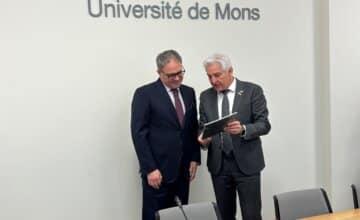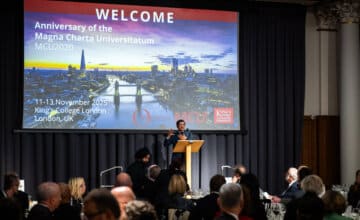“Stand up for academic freedom: not a privilege, but one of the keys for a free society”
Joint statement by the Rectors of the 10 Belgian universities – 7 July 2025
Academic freedom is not a luxury afforded to a privileged few, nor is it a goal pursued for its own sake. It is one of the foundations upon which democratic societies and scientific advancement are built. Protecting academic freedom is not about defending the comfort of scholars or preserving traditions. It is about safeguarding the very mechanisms through which knowledge is generated, questioned, and refined. It is a lever for progress, a precondition for innovation, and a guarantor of the rigorous inquiry that underpins credible science. Without the freedom to ask bold questions, explore controversial ideas, or challenge prevailing assumptions, discovery slows, innovation falters, and public discourse is impoverished. And yet we are witnessing the erosion of this freedom, not in sudden collapse, but through a steady and deliberate undermining that threatens the vitality of research, the quality of education, and the health of democratic life itself.
In an age of deepening political polarization, global instability, and declining trust in public institutions, we need to pay special attention to academic freedom. Universities are not merely centers of knowledge creation and transmission; they are sanctuaries of critical inquiry, intellectual risk-taking, and open dialogue. Their ability to operate as spaces of doubt and complexity is central to any healthy democracy. Yet today, that role is increasingly under threat—across the globe, and from both external and internal forces.
True academic freedom rests on three interdependent pillars: the right of individuals—both scholars and students—to teach, research, study, and express ideas freely; the institutional autonomy of universities to govern themselves without undue interference; and the responsibility of public authorities to protect and promote these freedoms. These are not abstract ideals—they are the necessary conditions for truth seeking and societal advancement.
The evidence of decline is stark. The Scholars at Risk “Free to Think 2024” report documents 391 attacks on scholars, students, and institutions across 51 countries in just one year. These include censorship, intimidation, arrests, and dismissals—often justified by appeals to national security or ideological neutrality. But whether through party loyalty embedded in university charters, politically appointed boards, or state-driven curriculum revisions, the result is the same: a systemic undermining of intellectual independence.
These are not isolated incidents; they reflect a structural assault on the autonomy and integrity of the university. Measures framed as “accountability” frequently result in self-censorship, politicized research priorities, and the silencing of dissent. The Academic Freedom Index shows that 45% of the world’s population is living in countries where academic freedom is under serious threat, only 15% enjoys far-reaching academic freedom. As Belgian universities we are privileged to belong to the top 5.
Worryingly, threats to academic freedom also originate from within the academy itself. Internal polarization, ideological gatekeeping, and fear of reputational damage are narrowing the boundaries of what can be discussed, studied, or questioned. Difficult conversations are avoided, and campuses risk becoming echo chambers rather than arenas of constructive disagreement. When curiosity gives way to conformity, the university loses its critical purpose.
Some frameworks—such as the Bonn Declaration on Freedom of Scientific Research, and the European Commission’s forthcoming guidelines on academic values—signal growing awareness of the problem. Former Italian Prime Minister Enrico Letta’s proposal to establish a “fifth freedom” within the European Union—the free movement of research, knowledge, innovation, and education—underlines the urgency of protecting intellectual mobility and academic independence within the single market. Yet in practice, protections remain inconsistent and too often symbolic.
The European University Association’s Autonomy Scorecard shows a concerning trend: across Europe, universities face increasing constraints. These range from regulatory overreach and informal political interventions to funding mechanisms that blur the line between strategic guidance and micromanagement. The COVID-19 pandemic only deepened this trend, as governments assumed greater control over academic operations—from campus closures to research agendas. While some measures were necessary, the long-term effect has been a diminished space for institutional self-governance.
Against this backdrop, the joint statement by the Dutch university rectors in 2025 stands out. Their declaration emphasizes that academic freedom is not only a legal right, but also a cultural and civic responsibility. They stress that openness must be preserved even when it is difficult, and that freedom must go hand in hand with responsibility—toward students, society, and the scientific standards that uphold credibility. Crucially, they acknowledge that academic freedom is threatened from above and within, and call for a national dialogue on the role of the university, the limits of protest, and the meaning of pluralism. It is a call that resonates far beyond the Netherlands.
This conversation must extend to all of us. Academic freedom is not self-sustaining—it requires vigilant stewardship. Policymakers must create enabling frameworks rather than mechanisms of control. University leaders must champion cultures of openness, not compliance. Academics and students must use their freedom with integrity and care, balancing rights with responsibilities.
The 1988 Magna Charta Universitatum reminds us that teaching and research must remain “free from political and commercial interference”. It also insists on the inseparability of teaching and research, with students playing an active role in the pursuit of knowledge. These principles are not nostalgic—they remain urgent and relevant today.
We must also reject the false dichotomy between academic freedom and scientific excellence. These values are not in conflict—they are interdependent. Scientific breakthroughs rarely emerge from consensus alone. They arise from difficult questions, uncomfortable findings, and intellectual courage. Without freedom of thought, there can be no true discovery. Without institutional autonomy, no resilience. Without public trust, no legitimacy.
As European Commission President Ursula von der Leyen recently affirmed, “Science has no passport, no gender, no ethnicity or political party… It is one of the most valuable global goods and it must be protected.” Science—and the academic freedom that enables it—connects people, advances societies, and provides the insight necessary to meet global challenges.
In a fractured and fragile world, universities remain one of our best hopes for connection, dialogue, and progress. But only if we protect their independence, preserve their integrity, and renew our collective commitment to academic freedom. This freedom is not the private property of professors. It is a public good that benefits us all. If we allow it to be diminished, we lose not only the university, but also our capacity to understand and shape the future.
Let us not make that mistake. Let us stand—firmly, openly, and together—for the freedom to think.
Read the original text online here.
Signatories: Annick Castiaux (UNamur), Jan Danckaert (VUB), Philippe Dubois (UMons), Herwig Leirs (UAntwerpen), Anne Sophie Nyssen (ULiège), Annemie Schaus (ULB), Luc Sels (KU Leuven), Françoise Smets (UCLouvain), Rik Van de Walle (UGent), Bernard Vanheusden (UHasselt).




